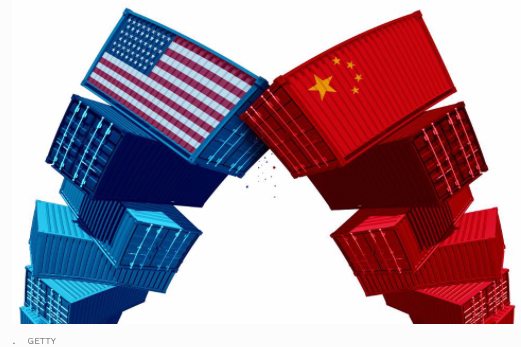US-China trade war- 4. Meanings & Positions
June 18, 2019

Before we launch into the respective positions of China and the USA, lets explore definitions:
What’s a tariff?
- A tax on merchandise imported from other countries.
- A bargaining chip to negotiate a better trade deal
Both of them are true, but note that a tax can be in place for years, decades even, whereas a bargaining chip is more temporary, it suggests that it will be removed when an agreement is reached.
Who pays the tax? Officially the tariffs are aimed at China, but in the end it is the US consumer who pays the tax.
How much is too much? Tariffs between 1% and 5% can be considered acceptable taxes, depending on the product, but anything above that becomes problematic. 25% is definitely hostile and unsustainable and can only be considered a bargaining chip.
Other weapons in a trade war. Countries can use other weapons such as:
- Sanctions: Punishing countries and companies for not abiding by its rules. A powerful US trade weapon used notably in the Iran conflict.
- Market access denial: Raising tariffs to 25% is one form of this, but China could counter not just by issuing tariffs of its own, but also by making life very hard for US companies in China
What is the difference between a trade war and a trade dispute?
- A trade dispute is when you have disagreements and you negotiate, you work together to fix them. The objective is to reach an agreement no matter how hard: a win-win scenario in which both parties benefit.
- A trade war is when you have disagreements and do not negotiate to fix them. You don’t talk, you don’t listen, you just fight. The objective is to beat the other party, in theory it is a zero sum game: you win, they lose – but, in reality, you both lose.
You can’t win a trade war. Why do people always say that? Because a trade war (a bit like a price war) is all about pain and how much of it you can take. Trade wars are costly to both economies involved. This one has barely started and is already costing the US consumers an estimated $1.4 bn per month (before the new tariffs kick in) while the Chinese economy is reeling.
… but you can settle a trade dispute. It takes skills, not just blunt arguments, but with persistence it can be done.
Which one are we in now?
Good question. Officially we are in a dispute because we are still negotiating but in reality we are already in a trade war since there have been no negotiations since May 10.
Note the latest: Trump just tweeted that the meeting with Xi Jinping on June 20 will take place. Excellent news, the stock market bounced up. Let us hope all goes well.
Have we been there before? Many times, with many different countries, notably Japan and even China in the past (when it was much smaller). But never on this scale.
Size matters. If you have a tradewar with a small economy, the impact is small. If you engage with a big economy, the impact is big, and the repercussions are unpredictable. In 2017, the US GDP was $19.39 trillion whereas China’s was $12.01 trillion. Combined, the US and China account for $31.40 trillion or about 40% of the global economy. Russia’s economy, in contrast, was only $1.52 trillion, less than the GDP of South Korea.
A trade war that directly affects nearly half of the world obviously has a profound impact. Repercussions could be huge.Consider these examples:
- Impact on US consumers if prices go up
- Impact on employment if US economy slows
- Impact on US business if China market is lost
- Impact on global economy if China’s economy slows
- Impact on US economy if the global economy suffers
In other words, any trade war is bad news. But a trade war between the USA and China is exponentially worst news and the health of both countries as well as the global economy depends on its outcome. So what are the positions of each side?
Make me: China understands it should give up its special privileges but it is not going to do so voluntarily. Quite the opposite: China will fight tooth and nail to preserve them for as long as possible. Arguably the only country in a position to force China to change is the USA and Trump deserves credit for tackling this challenge.
What does the US want? 3 things:
- A trade balance with China, no more deficit
- Equality in tariffs
- Equal and fair access to China’s market. No more IP theft.
What does China not want to give up? 2 things:
- Its sovereignty
- Its pride
Can these different positions be reconciled? In principle they could, provided that both parties are willing to negotiate, to compromise, to treat each other with respect and to be reasonable.
Is there a desire to fix things? The threat of an ongoing trade war itself is compelling. Both parties have now had a taste of things to come if no agreement is reached and it seems clear that both would prefer peace.
The risk is intransigence. Trump may feel his hand is so strong he has nothing to lose. He may be sure that the Chinese will blink first. He may not want to compromise. We will know more by Friday – but we will also address that in our blog that day.
◊◊◊
